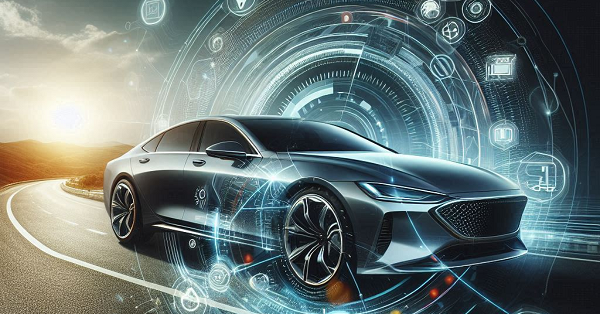Luxury cars are not just symbols of status and affluence; they are also showcases for cutting-edge technology. Manufacturers constantly innovate to provide the best performance, safety, and comfort features. In this article, we will explore which luxury car brands have implemented superior technology and delve into the specifics of these advancements.
Mercedes-Benz: Pioneering Safety and Autonomous Driving
Mercedes-Benz has long been at the forefront of automotive technology, particularly in the realms of safety and autonomous driving. Their flagship model, the S-Class, is often seen as a technological trendsetter.
Technology Highlights:
- PRE-SAFE® System: This system can sense an impending collision and prepares the vehicle and occupants for impact by tightening seat belts, adjusting seats, and even closing the windows and sunroof to prevent debris from entering.
- Distronic Plus® with Steering Assist: An advanced adaptive cruise control system that maintains a set distance from the vehicle ahead and can even steer the car to keep it in its lane.
- E-Active Body Control: Using a 48-volt system, this suspension technology can scan the road ahead and adjust the suspension of each wheel individually to provide an exceptionally smooth ride.
These technologies demonstrate Mercedes-Benz’s commitment to blending safety with comfort, making their cars not only luxurious but also some of the safest on the road (Blogging Raptor) (Alejandro Rioja).
BMW: The Ultimate Driving Machine with Cutting-Edge Connectivity
BMW is renowned for its focus on driving dynamics, but it also excels in connectivity and infotainment technology. The latest iteration of their iDrive system, found in models like the 7 Series and the new iX, is a testament to their innovation.
Technology Highlights:
- iDrive 8.0: BMW’s latest infotainment system features a curved display that combines a 12.3-inch digital instrument cluster and a 14.9-inch central touchscreen. It supports natural language processing and gesture controls for an intuitive user experience.
- Remote Software Upgrades: Similar to updating a smartphone, this feature allows owners to download and install new software updates over the air, ensuring their car always has the latest features and improvements.
- BMW Laserlight: These advanced headlights offer a range of up to 600 meters and can adjust their intensity and direction based on driving conditions, providing optimal visibility without dazzling other road users.
BMW’s emphasis on integrating advanced technology into their cars ensures that they not only deliver a thrilling driving experience but also keep drivers connected and informed (Blogging Raptor).
Audi: Innovating with Quattro and Virtual Cockpit
Audi combines sophisticated design with advanced technology. Known for their Quattro all-wheel-drive system and Virtual Cockpit, Audi vehicles offer both performance and cutting-edge features.
Technology Highlights:
- Quattro All-Wheel Drive: Audi’s Quattro system provides superior traction and handling by distributing power to all four wheels, adapting to changing road conditions in real time.
- Virtual Cockpit: A fully digital instrument cluster that replaces traditional dials with a high-resolution display, providing customizable information such as navigation, media, and vehicle status.
- Audi AI Traffic Jam Pilot: This semi-autonomous system can take over driving duties in slow-moving traffic, handling acceleration, braking, and steering on highways at speeds up to 60 km/h.
Audi’s combination of performance-oriented technology and driver assistance features makes their cars highly appealing to tech-savvy consumers (Blogging Raptor) (Alejandro Rioja).
Tesla: The Leader in Electric Innovation
Although not a traditional luxury brand, Tesla has revolutionized the automotive industry with its electric vehicles (EVs) and autonomous driving technology.
Technology Highlights:
- Autopilot: Tesla’s advanced driver assistance system uses cameras, radar, and ultrasonic sensors to enable features like automatic lane keeping, traffic-aware cruise control, and self-parking.
- Over-the-Air Updates: Tesla frequently updates its software remotely, adding new features and improving existing ones without the need for a service visit.
- Full Self-Driving (FSD) Capability: While still in development, Tesla’s FSD aims to provide fully autonomous driving, with the car capable of navigating to a destination with minimal driver intervention.
Tesla’s aggressive push into autonomous driving and continuous improvement through software updates set it apart as a leader in automotive technology (Blogging Raptor).
Conclusion
While each luxury car brand has its unique strengths, Mercedes-Benz, BMW, Audi, and Tesla all exemplify cutting-edge technology in the automotive industry. Mercedes-Benz leads in safety and autonomous driving, BMW excels in connectivity and driving dynamics, Audi offers advanced all-wheel-drive and digital interfaces, and Tesla pushes the boundaries of electric mobility and autonomous capabilities. Choosing the best technology depends on individual preferences, but all these brands showcase the pinnacle of innovation in the luxury car market.

Good 😊
Install sit
Good
Very good
My name is ramsy
Gfh
Good
Good
Very good installed
Toyota
I don’t know what’s going on
👍👍
G👍
Hai
Good.
As an automobile technician bm is more comfortable to work comparing to benz.
ഗുഡ്
ഗുഡ് 👍🏼👍🏼👍🏼
A good application 😃
Good
Good
Good v
Yes
Yesterday I saw this article